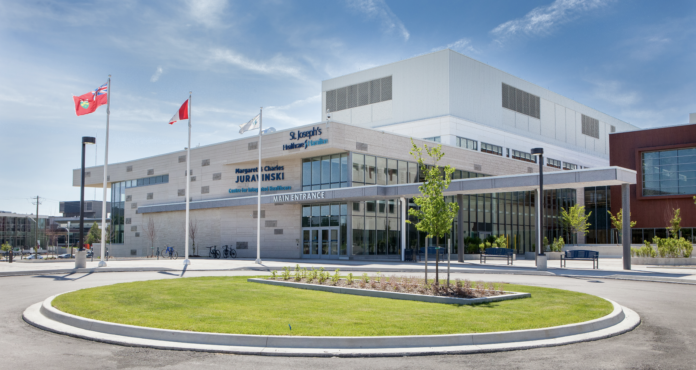
Integrated Systems, Integrating Care
St. Joseph’s Healthcare is leveraging innovative digital health technology to make integrated comprehensive care a reality, providing patients continuity of care across every interaction with the healthcare system. The model, developed and piloted first with chronic obstructive pulmonary disease, won a Canadian leadership award for innovation in improving outcomes. It is now being instituted as a standard of care at academic hospitals across Ontario.
Partnering with a local Hamilton digital health technology company, orthopedic surgeons at
St. Joseph’s have developed and tested an orthopedic patient portal, a practice and care management tool that gives surgeons real- time patient monitoring once they leave the hospital. It integrates patient feedback with reporting from other care providers involved
in the rehabilitation process, allowing for more responsive care and better outcomes.
The digital health project is part of a Synapse initiative which supports companies along their commercialization path, enabling them to perform on-site testing, product development, or clinical trials with a local care provider.
Mariner’s Surgical Precision
Mariner Endosurgery has taken full advantage of all the benefits of Hamilton’s life sciences innovation ecosystem. Formed in 2016, Mariner developed LaparoGuard, a soft-tissue surgical navigation platform that augments visualization during laparoscopic surgeries. Within a year it went from prototype, to first sale, having secured approval to treat its first patients at Hamilton General Hospital.
LaparoGuard sounds audio and video alarms when a surgeon encroaches on a safe buffer zone, while a video monitor displays augmented reality information, much like that projected on the windscreen of a fighter pilot.
Located at McMaster Innovation Park, the company worked closely with Innovation Factory, the regional innovation centre, as well as The Forge, the university campus accelerator. It’s also been backed by local angel investors and has collaborated with Hamilton surgeons who have been principal investigators on early trials.
“We are an early-stage life sciences company but we were able to engage in conversations with HHS and St. Joseph’s Healthcare,” said Mariner president and CEO Mitch Wilson.
“One of the greatest things about Hamilton is that things can happen very efficiently. Connections are much easier with decision- makers here. It’s easy to say you’re collaborative and not deliver on it. That doesn’t happen in Hamilton.”
GeneBlueprint for success
GeneBlueprint was among the inaugural group of high potential start-ups chosen to partner with the Innovation Exchange and has taken up residence in the downtown HHS-IBM Innovation Space. There, it has gained access to Hamilton Health Sciences clinicians and conducted a clinical trial. GeneBlueprint’s novel technology generates personalized genetic health and wellness programs based on a patented gene score data.
GeneBlueprint plans to migrate to the IBM Cloud platform and use Watson Analytics to uncover new insights from its trials. “Our immediate goal is to deliver preventative, predictive personalized healthcare that integrates hundreds of thousands of genetic variants. This large data requires computing and storage infrastructure, along with advanced analytics and cognitive computing software,” said co-founder and CEO Paul Mercante.
“Hamilton has an opportunity to be a centre of excellence for innovation within the healthcare start-up world,” said Mercante. “It offers a one-stop shop for resources and expertise that makes for a breeding ground of new innovation. And that reputation is just growing.”















